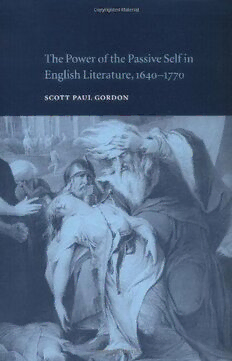
The Power of the Passive Self in English Literature, 1640-1770 PDF
293 Pages·2002·1.273 MB·English
Most books are stored in the elastic cloud where traffic is expensive. For this reason, we have a limit on daily download.
Preview The Power of the Passive Self in English Literature, 1640-1770
Description:
Challenging recent work contending that seventeenth-century English discourses privilege the notion of a self-enclosed, self-sufficient individual, this study recovers a counter-tradition that imagines selves as more passively prompted than actively choosing. Gordon traces the origins of such ideas of passivity from their roots in the non-conformist religious tradition to their flowering in one of the central texts of eighteenth-century literature, Samuel Richardson's Clarissa.
See more
The list of books you might like
Most books are stored in the elastic cloud where traffic is expensive. For this reason, we have a limit on daily download.
